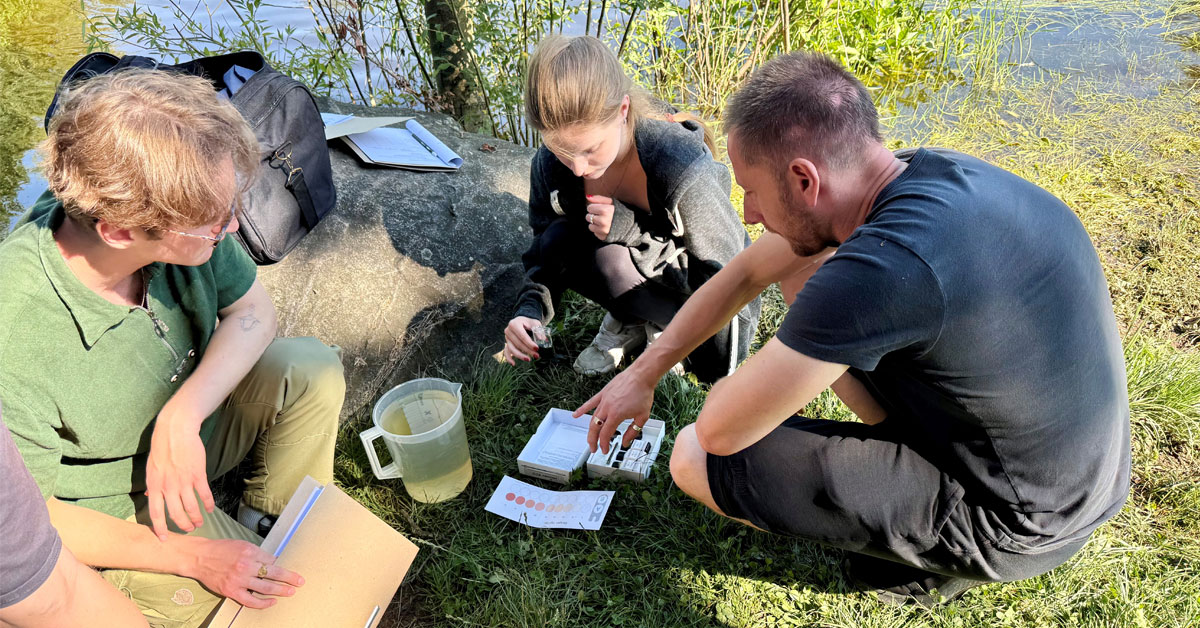News
UC San Diego Team Joins Baltic Partners to Strengthen Ukraine's Groundwater Resilience and Workforce Development
Published October 28, 2025
By Kimberly Mann Bruch

GRANDE-U students, who hail from around the world, explore aquifer conditions and measure physical and chemical characteristics of groundwater in different hydrogeologic settings throughout the Baltics. Hosted by GRANDE-U partners from the Baltics (Estonia, Latvia, Lithuania) with additional participants from Ukraine and Poland, a recent annual meeting allowed the students to showcase their progress of a build-out of a spatio-temporal groundwater database of the region — including the creation of models of the area’s transboundary water resources. Credit: Christine Kirkpatrick
University of California San Diego and New Mexico State University researchers have teamed up to integrate artificial intelligence and remote sensing with machine learning to improve groundwater storage estimates within the transboundary areas shared by Ukraine and Poland, and the Baltic states. The team’s project, Groundwater Resilience Assessment through iNtegrated Data Exploration for Ukraine (GRANDE-U), has also been working on the continued build-out of a spatio-temporal groundwater database of the region, including the creation of models of the area’s transboundary groundwater dynamics.
“Our overall goal with GRANDE-U is a better understanding of the dynamics and resilience of groundwater around the world - especially in countries where research and field work are disrupted such as Ukraine,” said Christine Kirkpatrick, GRANDE-U co-principal investigator (PI) and director of the Research Data Services Division at the San Diego Supercomputer Center (SDSC). “The integration of remote sensing with machine learning allows us to create better predictions of groundwater storage and flows, however, a recent meeting allowed us to expand our work in training students with fieldwork techniques.”
Project PI Ilya Zaslavsky, who is the director of the SDSC Spatial Information Systems Laboratory at SDSC, explained that the development of novel methods for timely, accurate assessment of groundwater storage and dynamics at higher spatial and temporal resolution is critical for water resource management worldwide.
“These efforts are especially important in countries like Ukraine, which has faced large-scale population displacement and severe damage to water infrastructure,” Zaslavsky said. “With limited capacity for sustained data collection and restricted opportunities for fieldwork, there is an urgent need for innovative approaches that both address environmental data scarcity and provide essential field training to hydrogeology students and early career researchers.”
The GRANDE-U project is finishing its second year. The team recently presented their work at International Data Week, the Nordic Hydrological Conference, and the European Geophysical Union’s annual conference. Additional conference presentations are found on the GRANDE-U website. The project has been jointly funded by the U.S. National Science Foundation (grant nos. 2409395, 2409396), Estonian Research Council (ETAG), Latvian Council of Science (LCS), Research Council of Lithuania (LMT), National Science Center of Poland (NCN), U.S. National Academy of Sciences and Office of Naval Research Global (DoD). The SDSC team is led by PI Ilya Zaslavsky, director of the SDSC Spatial Information Systems Laboratory; Co-PI Christine Kirkpatrick, director of the SDSC Research Data Services Division and Co-PI Ashley Atkins, SDSC deputy director.

